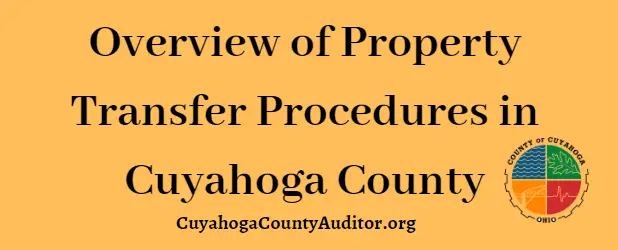Property transfer involves the legal process of transferring ownership of real estate from one party to another. In Cuyahoga County, Ohio, understanding and following the proper procedures is crucial to ensure a smooth and legally binding transfer.
Legal Framework in Cuyahoga County
Cuyahoga County operates under specific laws and regulations governing property transfer. These laws outline the necessary steps and requirements for transferring property ownership within the county boundaries. Compliance with these regulations is essential to avoid legal complications.
Preparing for Property Transfer
Before initiating the transfer process, several preparations are necessary. This includes gathering all required documentation such as deeds, surveys, and financial records. Additionally, assessing financial considerations such as taxes and fees is vital to ensure a seamless transfer.
Initiating the Transfer Process
The transfer process begins with the party initiating the transfer. This involves submitting the necessary paperwork to the appropriate authorities and adhering to legal requirements set forth by the county.
Title Search and Examination
One crucial step in the transfer process is conducting a title search and examination. This process helps identify any existing liens, encumbrances, or other title defects that may affect the transfer of ownership.
Resolving Title Issues
In the event that title issues are discovered during the examination process, it is essential to address them promptly. Common title issues include outstanding liens, boundary disputes, or undisclosed heirs. Resolving these issues is necessary to ensure a clear and marketable title.
Drafting and Reviewing Documents
Drafting and reviewing the necessary transfer documents is another critical step in the process. This includes preparing deeds, affidavits, and other legal documents required for the transfer. Thorough review of these documents is essential to avoid errors or omissions that could delay the transfer.
Closing the Transaction
The closing of the transaction is the final step in the property transfer process. During this stage, all parties involved gather to sign the necessary documents and finalize the transfer details. Ensuring legal compliance and accuracy is crucial to prevent any future disputes.
Post-Transfer Obligations
Following the transfer of ownership, there are several post-transfer obligations that must be addressed. This includes transferring utilities and services into the new owner’s name and updating records with the appropriate agencies.
Common Pitfalls to Avoid
While transferring property, several common pitfalls should be avoided. These include overlooking important details, such as property boundaries or easements, and failing to address title issues promptly. Being aware of these pitfalls can help ensure a smooth transfer process.
Importance of Professional Assistance
Seeking professional assistance, such as that of real estate agents or legal counsel, can greatly benefit individuals navigating the property transfer process. Real estate agents can provide valuable guidance and assistance throughout the process, while legal counsel can offer expertise in addressing complex legal issues.
Conclusion
In conclusion, understanding the property transfer procedures in Cuyahoga County is essential for anyone involved in buying or selling real estate. By following the outlined steps and seeking professional assistance when necessary, individuals can ensure a smooth and legally sound transfer of ownership.
FAQs
-
Can I transfer property without professional assistance?
While it’s possible to transfer property without professional assistance, it’s highly recommended to seek guidance from real estate agents or legal counsel to ensure a smooth process and avoid potential legal issues.
-
What documents are required for property transfer?
The required documents for property transfer may vary depending on the specific circumstances, but commonly include deeds, surveys, affidavits, and financial records.
-
How long does the property transfer process take?
The timeline for property transfer can vary based on factors such as the complexity of the transaction and any title issues that need to be resolved. On average, the process can take several weeks to complete.
-
What happens if title issues are discovered during the transfer process?
If title issues are discovered during the transfer process, they must be addressed and resolved before the transfer can be completed. This may involve working with legal counsel to clear any liens or disputes affecting the property title.
-
Is it necessary to conduct a title search before transferring property?
Yes, conducting a title search is essential to identify any existing liens, encumbrances, or other title defects that may affect the transfer of ownership. Resolving these issues is crucial to ensure a clear and marketable title.
